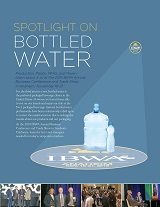The US Conference of Mayors (USCM) today passed Resolution 70, misleadingly titled “Supporting Municipal Water Systems,” at its annual meeting in Miami, Florida. The resolution is riddled with erroneous statements and errors about bottled water regarding its comprehensive regulation by the Food and Drug Administration (FDA), varied product costs and the industry’s minimal use of natural resources.
The USCM resolution also ignores the bottle water industry’s long history of environmental stewardship, its light-weighting of plastic containers, the fact that every bottled water container is 100 percent recyclable and the industry’s support for broad-based, single-stream community recycling efforts. The resolution is not in the public interest and could discourage consumers from drinking bottled water, which is a safe, healthy, conveniently-available food product.
Mayor Don Robart of Cuyahoga Falls, Ohio, who chairs the USCM Environmental Committee, and several other mayors expressed their concern that the resolution went too far in suggesting a phase out of bottled water purchases by municipal governments and did not sufficiently recognize the necessity, practicality and health benefits of the product. Mayor William J. Healy II of Canton, Ohio called the resolution “absurd.”
Addressing those mayors and activists who cited the costs associated with bottled water, Mayor Robart noted that, “There is a whole aisle in the store I go to with a wide variety of bottled waters. I assure you, consumers know exactly what they are they are buying and they like it.” Several mayors said that there are many serious problems facing U.S. cities, and found the resolution itself to be trivial and unnecessary.
Atlanta, Georgia, Mayor Shirley Franklin expressed concern that even a non-binding resolution might hamper public comfort at civic events such as marathons, concerts and other public gatherings. The USCM resolution also ignores federal law, which mandates that FDA regulation of bottled water must be as protective of public health and safety as the Environmental Protection Agency’s (EPA) standards for tap water.
The resolution also fails to point out that bottled water produced from municipal water sources is subjected to extensive treatment to further purify the water to meet the FDA’s specific definitions and standards. IBWA notes that transportation of bottled water is fundamentally no different than the transportation of any other food product. Moreover, 60 percent of IBWA’s membership is made up of small businesses serving regional or local markets.
According to the EPA, the production of plastic containers for bottled water contributes only 0.04 percent of total greenhouse gas emissions. And PET bottled water containers make up only one-third of 1 percent of the waste stream in the United States. IBWA supports comprehensive environmental conservation policies but strongly believes that any efforts to reduce the environmental impact of packaging must focus on all consumer goods, and not just one industry.
The non-binding resolution states: “The U.S. Conference of Mayors recognizes the importance of bottled water in times of emergencies and when municipal water is not available.” However, this fails to recognize that production of this healthy and safe product only for emergency distribution is not commercially possible. In order for companies to produce bottled water, there must be a vibrant and fully functional commercial market. The chair of the USCM Environmental Committee did express his gratitude for the 250,000 bottles of water donated by just one IBWA member to the Midwest flood victims a week before the USCM meeting.
Many other IBWA companies also recently contributed bottled water to aid the citizens of these states.



























